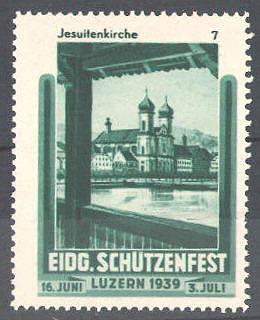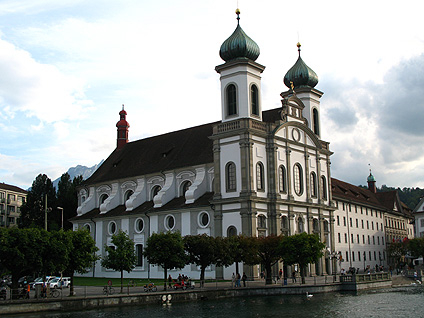The Jesuit College and Church in Lucerne


SWITZERLAND, a cinderella for the 1939 Swiss
Federal Shooting Festival (Eidgenössisches Schützenfest) in
Lucerne, Switzerland
features the Jesuit Church of St. Francis Xavier
JESUIT
INSTITUTIONS |
The Jesuit College and Church in Lucerne


SWITZERLAND, a cinderella for the 1939 Swiss
Federal Shooting Festival (Eidgenössisches Schützenfest) in
Lucerne, Switzerland
features the Jesuit Church of St. Francis Xavier
When Cardinal Charles Borromeo was in Lucerne in 1570 he urged the authorities to invite the Jesuits to found a school there and introduce the spirit and reforms of the Council of Trent to the region. On August 7, 1574 three Jesuits from Germany arrived in Lucerne. The temporary house where they began their pastoral and educational activities is still a mission of the Jesuit province of Upper Germany. Later the city authorities gave the Jesuits the use of the Rittersche Palast and on Christmas of 1578 a small chapel was opened in the palace. The foundation charter of the Jesuit College of Lucerne (Collegium Lucernense) was signed on May 10 1577. Civil authorities agreed to provide the necessary buildings for the college and a score of Jesuits; the Jesuits agreed to develop and administer the college and provide pastoral services to the city. A few years after its foundation, the college was already one of the most important of the Jesuit province of Germany.
In 1579 the Jesuits got a new building opposite the palace. Rebuilt in 1729-1731, this building is now the repository of the state archives. The chapel of St. Michael was built in 1588-1591 west of the Rittersche Palast. But it eventually proved to be too small, and the Church of St. Francis Xavier was begun. The first stone of the new edifice was laid on the feast of St. Francis Xavier, 3 December 1666. The project was finished and the church dedicated 29 August of 1677. It was the first large Baroque building in Switzerland, and is part of the total complex of the Jesuit college there. The identity of the principal architect is not known, but the Jesuit Brother Heinrich Mayer, SJ was the author of the interior side chapels. And he is also responsible for the interior of the church, including the altar which was not installed until 1681.
When Clement XIV suppressed Jesuits in 1773 Lucerne authorities asked the Jesuits to remain at their posts and continue their pastoral and educational activities as secular priests. When the order was restored in 1814, the Jesuits were invited to return to Lucerne by the canton authorities. They were reluctant at first because of strong opposition from radical anti-Catholicism, and when they finally did return in 1844, they encountered a serious political situation in the country that led to a civil war, the Sonderbund War. That war was lost by the Catholic cantons, and in December of 1847 the Jesuits were expelled from the country, and Switzerland introduced an article into its constitution prohibiting forever the presence of Jesuits in Switzerland. This prohibition contradicting freedom of religion prevented Switzerland from entering the European Union until in 1973 a slim majority of 54.9% voted to amend the constitution to permit the Jesuits back in.